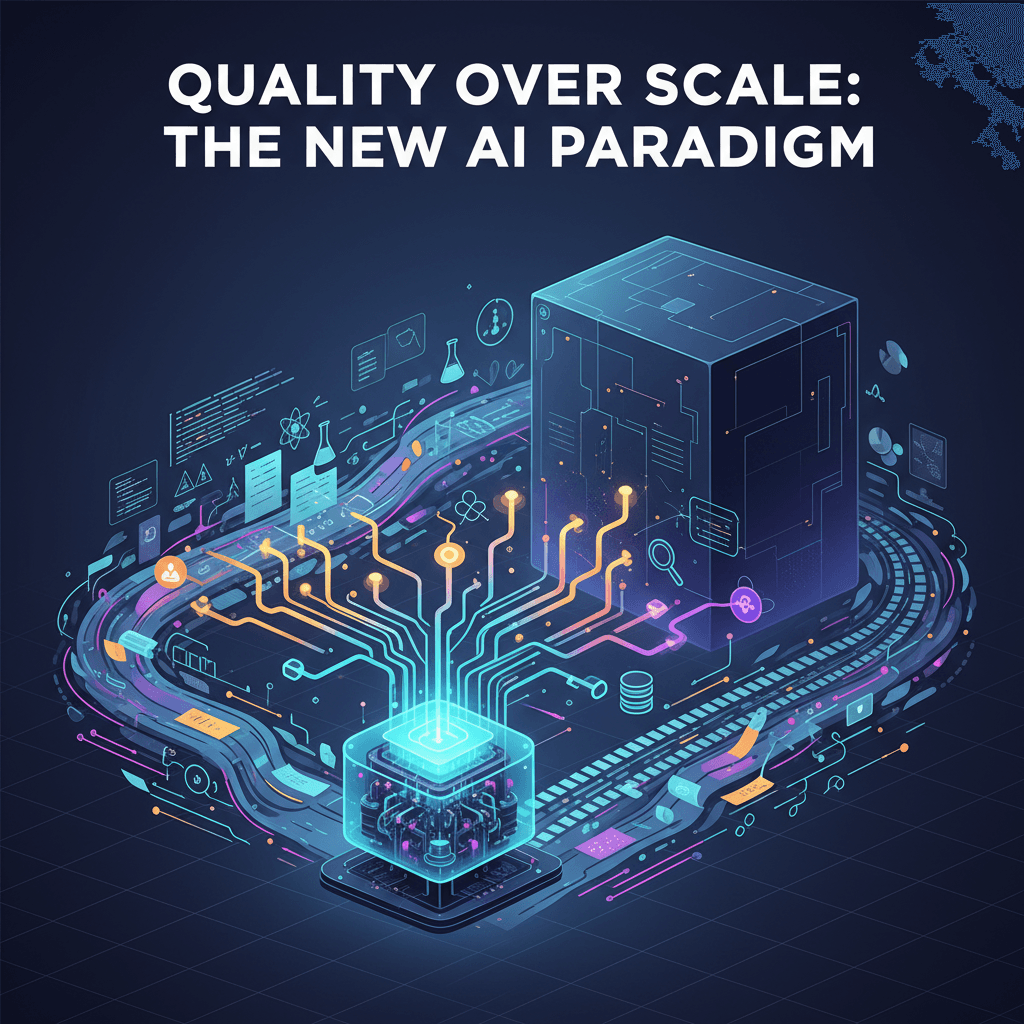New Research Reimagines AI: Quality, Not Scale, Creates Superior Agents
Quality over quantity: how data, algorithms, and reasoning strategies are shaping a new generation of powerful, efficient AI.
October 25, 2025

In a significant advancement for the field of artificial intelligence, a collaborative research effort has identified three pivotal factors that substantially enhance the intelligence of AI agents. The work, conducted by researchers from the National University of Singapore, Princeton, and the University of Illinois Urbana-Champaign, highlights the indispensable roles of data quality, algorithm design, and reasoning strategy in the development of more capable and efficient AI systems. This new understanding provides a foundational roadmap for creating smaller, yet more powerful, AI agents that can outperform their much larger counterparts, signaling a potential shift in the trajectory of AI development. The findings emphasize a move away from the brute-force approach of building ever-larger models toward a more nuanced methodology focused on the quality of training and the sophistication of an agent's cognitive processes.
At the forefront of these discoveries is the critical importance of data quality, with the research demonstrating a stark contrast between agents trained on real versus synthetic data. The study revealed that models trained on authentic learning trajectories, which capture the complete and often messy process of human reasoning, significantly outperform those trained on artificially generated data.[1] For instance, a 4-billion-parameter model trained on real data achieved nearly 30 percent accuracy on a math benchmark, whereas the same model trained on synthetic data struggled to reach 10 percent.[1] Real-world data encapsulates the entire workflow of problem-solving, including initial analysis, tool use, error correction, and self-reflection.[1] Synthetic data, which often presents a sanitized and direct path to a solution, fails to capture these essential nuances of learning from mistakes and adapting strategies.[1][2] This distinction is crucial as it suggests that the journey of reasoning is as important for an AI's development as reaching the correct answer. The richness and complexity of real user data ground AI models in the intricacies of actual human behavior, making them more accurate and relevant.[2]
Further compounding the impact of data quality is the principle of data diversity. The researchers found that training an AI on a varied dataset spanning multiple domains, such as math, science, and programming, dramatically accelerates the learning process.[1] An agent trained on a mixed dataset reached a 50 percent accuracy benchmark significantly faster than one trained on a single-subject dataset.[1] This underscores the importance of exposing AI models to a wide range of scenarios and problem types to enhance their robustness and adaptability.[3] Diverse training data helps models to generalize better, reduce biases, and handle challenging or rare "edge cases" that are often absent in more uniform datasets.[3][4] For the AI industry, this highlights that the curation of high-quality, diverse, and real-world datasets is not merely a preliminary step but a core component in building truly intelligent systems.
The second cornerstone of smarter AI agents, as identified by the research, is sophisticated algorithm design. While the race for larger parameter models has dominated headlines, this study demonstrates that a well-designed algorithm can enable a smaller model to match or even exceed the performance of a much larger one.[1] The evolution of AI agents has been driven by advancements in algorithms that have moved beyond simple rule-based systems to complex models capable of learning and adaptation.[5][6] Modern algorithm design focuses on creating modular and adaptive architectures that allow for easier upgrades and scalability.[5] Techniques such as reinforcement learning, where an agent learns through trial and error by receiving rewards or penalties for its actions, are central to this advanced approach. This method of learning is particularly effective for developing agents that can operate in dynamic and complex environments. The goal is to create systems that can not only follow instructions but also learn from their interactions with the environment to continuously improve their performance.[7]
Finally, the researchers emphasized the profound impact of an AI agent's reasoning strategy on its overall intelligence. The ability of an agent to break down complex problems, explore different solutions, and learn from its own mistakes is a key differentiator. Advanced reasoning strategies such as Chain-of-Thought (CoT), where the model generates a series of intermediate steps to solve a problem, have shown to improve accuracy in complex tasks.[8][9] Another powerful technique is ReAct, which stands for "Reasoning and Acting," where the agent can interact with external tools and information sources to inform its reasoning process.[8][9] More advanced frameworks like Tree-of-Thoughts allow an AI to explore multiple reasoning paths simultaneously, akin to a human brainstorming different approaches to a problem.[9] A crucial component of these advanced reasoning strategies is the capacity for self-reflection and self-correction.[10][11] This involves the agent critiquing its own outputs, identifying flaws in its reasoning, and iterating to produce a better result.[10][11][12] This internal feedback loop enables an AI to become more reliable and autonomous, as it can learn and improve without constant external guidance.[10][11]
In conclusion, the research from the National University of Singapore, Princeton, and the University of Illinois Urbana-Champaign provides a compelling argument that the future of AI may not lie in sheer scale, but in the deliberate and intelligent design of the agents themselves. By focusing on the trifecta of high-quality, diverse, and real-world data, advanced and adaptive algorithm design, and sophisticated reasoning strategies that incorporate self-reflection, the AI community can foster the development of smarter, more efficient, and more capable artificial intelligence. These findings have significant implications for the industry, suggesting that the path to more powerful AI is not just about building bigger models, but about building better learners. The emphasis on quality over quantity could democratize the development of advanced AI, allowing for the creation of highly competent systems without the need for massive computational resources.